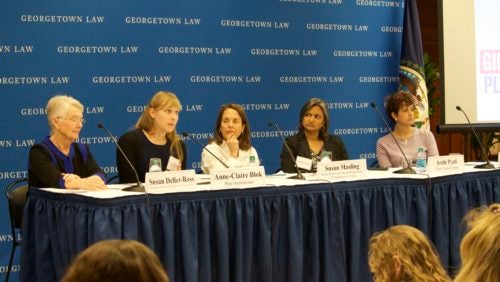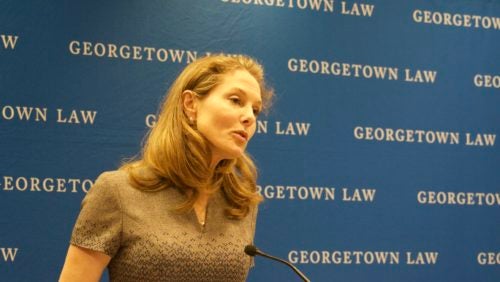Defending Women’s Human Rights: Achievements, Obstacles, and Opportunities for Empowerment
The Human Rights Institute presented a critical conversation on the state of human rights for women and girls both domestically and abroad.
Around the world, the rights of women and girls are under threat. Despite progress in key areas, the statistics regarding female victimization and abuse worldwide are staggering. Over 120 million girls have been raped or endured other acts of sexual violence during their lifetimes. At least 200 million women and girls alive today have undergone female genital mutilation (“FGM”)—the majority under the age of 5. Approximately 750 million women and girls today were married as children. 71% of human trafficking victims detected globally are women and girls, and 75% of this group were trafficked for the purpose of sexual exploitation. Within the U.S., Trump’s border policies have increased the insecurity of migrant women, upping their risk of trafficking.
The 2018 Samuel Dash Conference on Human Rights presented critical conversations in each of these areas from women’s rights advocates and lawyers working both within and outside the United States. The panels raised awareness for problems faced by women and girls worldwide, including child marriage and FGM, maternal health and disaster relief, defamation or threats of violence as women defenders of human rights, and human trafficking. It also offered potential paths forward. A hopeful yet introspective look at women’s human rights and those who seek to advocate for them, the 2018 Dash Conference examined not only the issues, but the practicalities of achieving meaningful, victim-focused responses.
Panel 1 — Rights of the Girl Child: Ending the Practices of FGM and Child Marriage
Overview
Around the world, millions of young girls are subject to the dangerous and abusive practices of FGM and child marriage. Stemming from traditional practices and social pressure to keep young women eligible as brides, ending FGM and child marriage requires more than just criminalization. How can we combat cultural barriers, promote the rights of girls and young women, and work to eradicate these harmful practices? This panel of advocates, lawyers, and scholars explained the root causes of the issues, their global scope, and how to respond both in the U.S. and around the world.
Noting challenges in the international human rights framework itself, Anne-Claire Blok stated that treaties oftentimes fail to differentiate between age and gender, leaving issues involving girl children to fall under women’s rights or youth rights. CEDAW is also the most heavily reserved treaty in the UN system, with many States Parties reserving to key provisions of the gender equality treaty that affect girls. All this means that the international framework lacks consistency in the protection of girls’ rights around the world. “The international community needs to ensure that future international policy documents really reflect girls’ realities and challenges,” she stated.
Child marriage is a phenomenon that affects not just girls (and boys) around the world but also in the United States, said Lyric Thompson. There are myriad drivers of child marriage, including a lack of economic resources in a household, risks of sexual violence, and even climate change. Girls who marry as children are vulnerable to negative health impacts, increased risk of domestic violence, a curtailment of their education, among other harms. In highlighting some strategies to curb the practice—such as providing economic incentives to families to continue girls’ education or working with religious and community leaders—Ms. Thompson asserted that ending child marriage by 2030 would not just achieve SDG 5.3, it would effectively achieve many of the other goals that the international community has agreed as well.
Susan Masling emphasized the particular difficulties of combating FGM. Because of the matriarchal and behind-closed-doors nature of the practice, victims are unlikely to come forward, making the crimes difficult to prosecute. “Unlike other forms of child abuse, it is usually done in the best interest of the child. Parents think they’re doing something that’s going to help their daughters,” whether with marriageability, cleanliness, or because it’s something their grandparents would’ve wanted. The cultural significance of the practice oftentimes overshadows the harm done unto the girl, but it is undeniable that FGM causes complications with sexuality and childbirth, and in extraordinary situations can result in the death of the girl. Moderator Susan Deller-Ross notes that “Culture does not give you the right to discriminate against girls.”
Panelists
Susan Deller-Ross (Moderator), Director, International Women’s Human Rights Clinic, Professor of Law, Georgetown University Law Center
Anne-Claire Blok, Human Rights Advisor, Plan International
Susan Masling, Trial Attorney, Human Rights and Special Prosecutions, U.S. Department of Justice
Archi Pyati, Chief of Policy, Tahirih Justice Center
Lyric Thompson, Director of Policy & Advocacy, International Center for Research on Women (ICRW) and co-chair, Girls Not Brides USA advocacy coalition
Watch the panel to learn more about the drivers and impacts of FGM and child marriage, as well as strategies for the eradication of these harmful practices:
Keynote Address
Her Royal Highness Princess Sarah Zeid of Jordan, a maternal and newborn health advocate who worked with UNHCR and Human Rights Watch, delivered the keynote address. In the field of women’s rights advocacy, she noted that “although there is progress, it is not fast enough nor far enough to avoid our being overwhelmed by the more powerful forces of global insecurity.” Women and children, on average, make up 75% of a population in need; in South Sudan, this number rises to 86%. 18 million adolescent girls give birth worldwide each year. Women are 14 times more likely to die from a natural disaster than men globally, as in many places, women cannot go outside without a man or do not receive physical training that can be vital to survival in a conflict situation.
Princess Sarah closed her speech by highlighting the need for creative and courageous thinking to combat mass global issues, and woman-centric justice. “Women’s rights must not be about silos. They must be grounded in compassion and anchored at the core of policy and program aspirations, uniting activities and efforts. Life, dignity, and respect for a woman must not be reduced to mere lip service, a woman’s strength and potential brushed aside. It is their health and well-being that are the keystones to sustainable development, peace, and security.”
Speakers
William Treanor (Introduction), Dean of Georgetown Law
Her Royal Highness Princess Sarah Zeid of Jordan, Maternal and newborn health advocate
Watch Her Royal Highness Princess Sarah Zeid of Jordan’s moving keynote address on the importance of persistent, creative, and brave advocacy for women’s justice, and subsequent Q&A session, below.
Panel 2 — Empowering and Protecting Women Human Rights Defenders
Overview
The work of human rights defenders is dangerous, and woman human rights defenders (“WHRDs”) face compounded, gender-based threats. This panel, comprised both of international women human rights defenders and U.S.-based advocates, shared their own experiences as WHRDs, as well as tangible solutions to combating gender-based threats to human rights advocates.
The unique struggles of WHRDs often go unnoticed or unchallenged, but it is undeniable that the face of the human rights activist in the public conscience is male, rewarded for his courage. WHRDs, like their male counterparts, are often punished for their advocacy, but while men can easily seek redress in many cases, it is not as simple for WHRDs, Cynthia Rothschild noted. Noorjahan Akbar echoed this: “Often when they seek justice, they’re demonized, they’re marginalized, and they’re not listened to. They’re seen as opportunists using their stories for fame.” The threats facing WHRDs differ from their male counterparts, Lisa VeneKlasen said, making WHRDs generally vulnerable or invisible to the general public. Rothschild explained that women are often attacked for their activism not by the state, but by individuals, through sexual and domestic violence, through threats, or through defamation, crimes that are less tangible than those men face: arbitrary imprisonment or state-sponsored killing. Akbar has noticed this phenomenon in her own advocacy work. “I’ve met woman after woman after woman who was attacked using defamation and using character assassination. And these things go far in a country without rule of law.” To combat this, Akbar has seen success allowing woman writers to use pen names.
Within the U.S., Cynthia Rothschild sees an attack on civil society space by the state and religious authorities in light of recent felony charges for journalists, targets of protestors, and gender-based attacks on Planned Parenthood and women’s health clinics. “There’s an agent seeking to restrict the rights of all defenders, including women human rights defenders.” She urges us all to “Keep your eye on the global context, but always, always think about what’s happening locally.”
Emphasizing their own experiences in Afghanistan and Manipur respectively, Akbar and Binalakshmi Nepram both urged audience members to remember to hire, uplift, and center local voices in global human rights advocacy, arguing for the success of funding grassroots organizers. “Solidarity is a must,” Nepram says.
Panelists
Ginna Anderson (Moderator), Senior Counsel, American Bar Association, Center for Human Rights Justice Defenders Program
Noorjahan Akbar, Human Rights Defender, Afghanistan
Binalakshmi Nepram, Human Rights Defender, Founder-Manipur Women Gun Survivors Network & IIE-SRF Visiting Scholar
Cynthia Rothschild, Scholar, Independent Activist & Consultant
Lisa VeneKlasen, Executive Director and Co-Founder, JASS (Just Associates)
Hear the incredible stories of global human rights activists and defenders, and how we can more effectively center women’s voices and experiences in the field of human rights advocacy, as well as the subsequent Q&A session, below.
Panel 3 — Combating Human Trafficking of Women and Girls
Overview
Human rights groups estimate that around 45 million people are held in modern versions of slavery today—more than at any other point in human history. Women and girls make up the vast majority of these victims of trafficking and exploitation. What can be done to prevent the coercion of labor and sex from individuals, and what is the best way prosecute traffickers while caring for victims?
The panel, a group of four leading anti-trafficking advocates and prosecutors, with focus both domestically and abroad, provided nuanced definitions of trafficking as well as experiences and strategies to combat it. Commonly misunderstood to refer to the smuggling or movement of persons, human trafficking relates solely to coercion of victims into providing labor, sexual acts, or other work, John Cotton Richmond explained. He described how traffickers use various forms of coercion to trap victims, including threatening family, using debt manipulation, or manipulating addiction to and withdrawal from narcotics. Still, most victims do not self-identify, making prosecution a challenge.
Karen Stauss talked about her experience as a prosecutor and the vitality of using “a victim-centered and trauma-informed approach in investigating and prosecuting human trafficking.” She stated that when working with victims, it is vital to give them choices, especially the choice of whether to testify. “The nature of the harm is the taking away of choices,” she said. “As many choices as you can give back to the victim is part of what justice means, it’s part of making that victim whole.”
Upon being asked about the relationship between immigration status and trafficking, the experts cited issues both in the U.S. and in Southeast Asia. Brianna Gehring noted that “not having proper immigration status makes individuals quite vulnerable to trafficking,” stating that without proper legal status, individuals are unable to obtain legal employment, go to school, or have access to medical services, all of which increases vulnerability to exploitation. Melysa Sperber traced these issues in the U.S. back to Trump Administration policies, saying that “every immigration policy this administration puts forward escalates people’s vulnerability to trafficking.”
Panelists
Denise Brennan (Moderator), Professor and Chair, Department of Anthropology, Georgetown University
Brianna Gehring, Senior Program Director for SEA, International Justice Mission
John Cotton Richmond, Founding Director, Human Trafficking Institute
Melysa Sperber, Director of Policy & Government Relations, Humanity United
Karen Stauss, Senior Policy Counsel, Human Trafficking Prosecution Unit, U.S. Department of Justice
Watch the panel on defining and effectively prosecuting trafficking crimes and the subsequent Q&A session below.
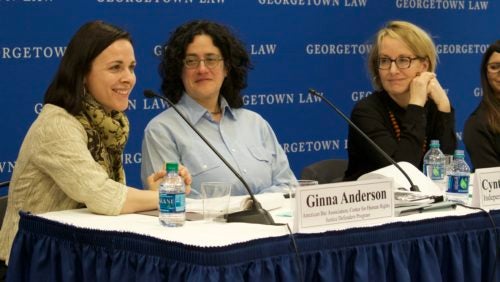
Ginna Anderson moderates the WHRD Panel at the 2018 Dash Conference. Photo Credit: Amanda Strayer.
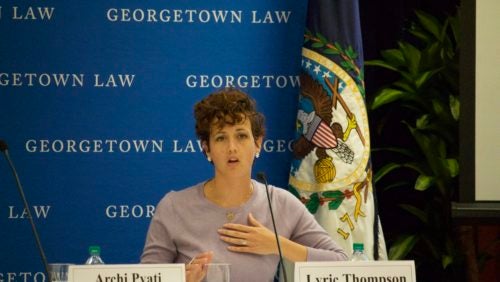
Lyric Thompson addresses the 2018 Dash Conference on child marriage. Photo Credit: Amanda Strayer.
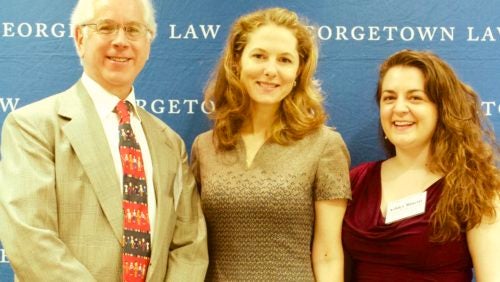
Professor Andy Schoenholtz, HRH PRincess Sarah Zeid, and HRI Dash-Muse Fellow Ashley Binetti at the 2018 Dash Conference. Photo Credit: Amanda Strayer.
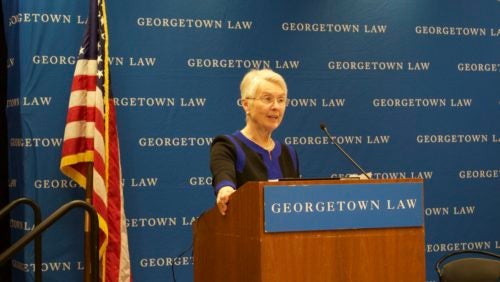
Professor Susan Deller Ross opens the panel on the rights of the girl child at the 2018 Dash Conference.
Photo Credit: Amanda Strayer.
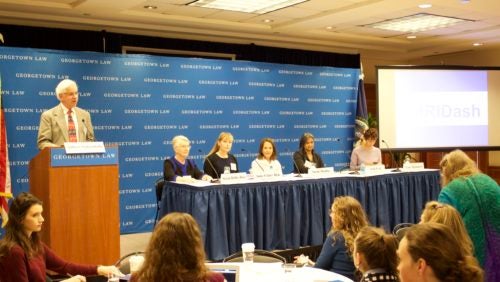
The rights of the girl child panel addresses the 2018 Dash Conference. Photo Credit: Amanda Strayer.
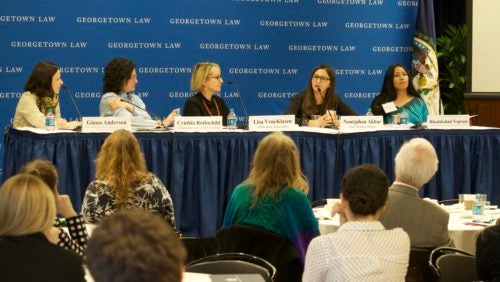
The women human rights defenders panel addresses the 2018 Dash Conference. Photo Credit: Amanda Strayer.
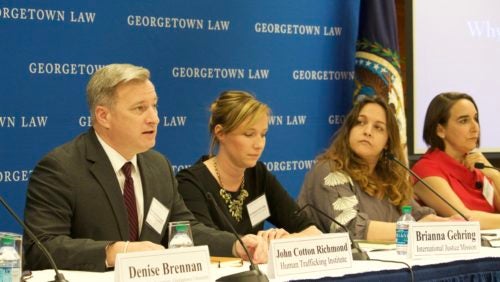
The human trafficking panel addresses the crowd at the 2018 Dash Conference. Photo Credit: Amanda Strayer.
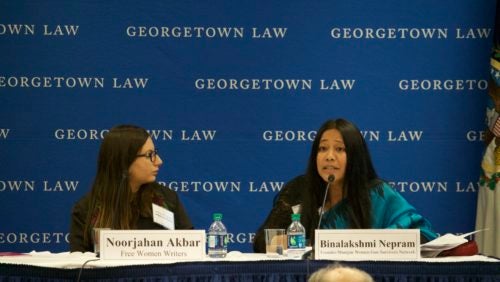
Bina Nepram addresses WHRD issues at the 2018 Dash Conference. Photo Credit: Amanda Strayer.
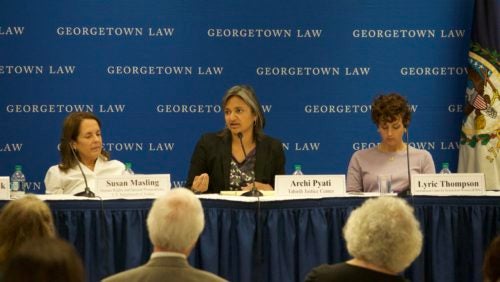
Archi Pyati addresses FGM at the 2018 Dash Conference. Photo Credit: Amanda Strayer.
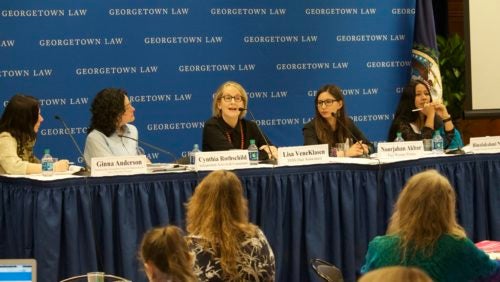
Lisa VeneKlasen addresses WHRD issues in Mesoamerica at the 2018 Dash Conference.
Photo Credit: Amanda Strayer.
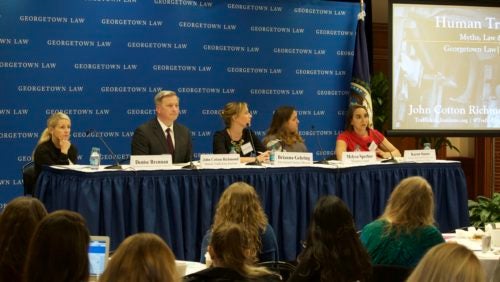
The human trafficking panel addresses the 2018 Dash Conference. Photo Credit: Amanda Strayer.

